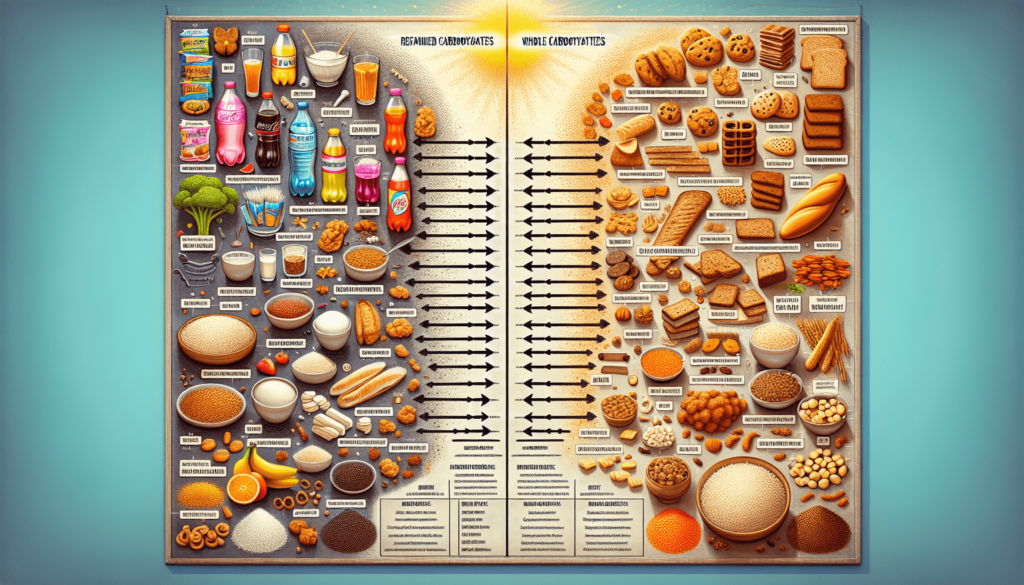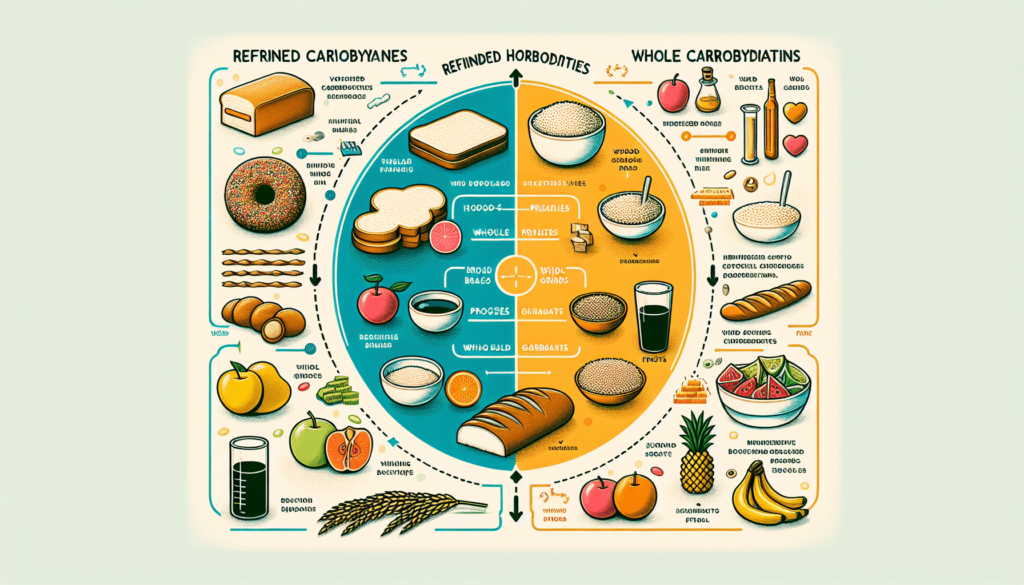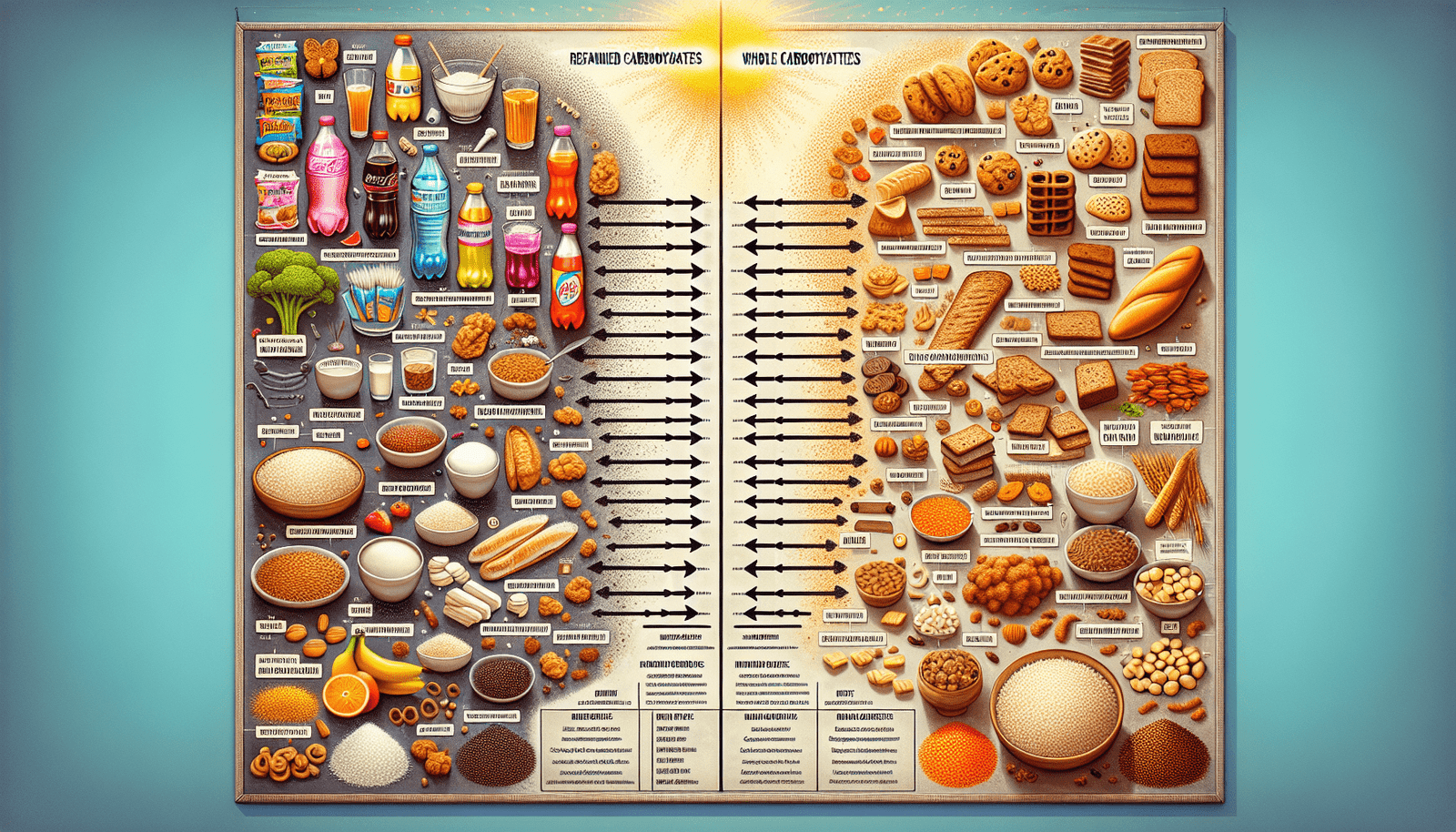Are you confused about the difference between refined and whole carbohydrates? Look no further! In this article, we will break down the distinction between the two, helping you to make informed choices about your diet. Whether you’re aiming for a healthier lifestyle, trying to lose weight, or simply looking to understand the impact of carbohydrates on your body, understanding this difference is key. So let’s unravel the mystery and discover the truth behind refined and whole carbohydrates.

What are Carbohydrates?
Carbohydrates are one of the three macronutrients required by the body, along with fats and proteins. They are the primary source of energy for your body and play a crucial role in various bodily processes. Carbohydrates are compounds made up of carbon, hydrogen, and oxygen atoms.
Definition of carbohydrates
Carbohydrates are organic compounds that consist of sugar molecules. They come in various forms, including sugars, starches, and fibers. Carbohydrates are classified based on their chemical structure, with simple and complex carbohydrates being the two main types.
Functions of carbohydrates in the body
Carbohydrates serve many essential functions in the body. Firstly, they provide energy for all bodily processes, including physical activity and brain function. Carbohydrates are broken down into glucose, which is used as fuel by the cells. Additionally, carbohydrates play a crucial role in maintaining healthy gut function, regulating blood sugar levels, and supporting overall brain health.
Refined Carbohydrates
Refined carbohydrates, also known as simple carbohydrates, are carbohydrates that have undergone extensive processing and refining. This process removes many of the essential nutrients and fibers present in the original food source, resulting in a product with a higher glycemic index.
Definition of refined carbohydrates
Refined carbohydrates are carbohydrates that have been processed to remove the bran and germ of the grain, leaving only the endosperm. This removes most of the fiber, vitamins, and minerals, resulting in a product that is quickly and easily digested and absorbed by the body.
Examples of refined carbohydrates
Some common examples of refined carbohydrates include white bread, white rice, sugary cereals, pastries, sodas, and candy. These foods are often made from refined grains, where the nutrient-rich outer layers of the grain have been stripped away.
Processing and refining methods
Refined carbohydrates undergo processes such as milling, bleaching, and stripping, which remove the most nutrient-dense parts of the grain. This refining process gives these carbohydrates a finer texture, longer shelf life, and a milder taste, but it also removes the natural fiber, vitamins, and minerals present in the original food source.
Effects of refined carbohydrates on health
Consuming too many refined carbohydrates can have detrimental effects on your health. These carbohydrates are rapidly digested and absorbed, causing a sharp increase in blood sugar levels. This spike in blood sugar can lead to energy crashes, increased risk of chronic diseases such as type 2 diabetes and obesity, and can contribute to inflammation in the body.
Whole Carbohydrates
Whole carbohydrates, on the other hand, are minimally processed and retain their natural fiber, vitamins, and minerals. They are considered complex carbohydrates and are generally a healthier choice compared to refined carbohydrates.
Definition of whole carbohydrates
Whole carbohydrates are carbohydrates present in their natural, unrefined form. They include foods such as whole grains, fruits, vegetables, legumes, and nuts. These foods have not been heavily processed and still contain their natural fibers and nutrients.
Examples of whole carbohydrates
Some excellent sources of whole carbohydrates include quinoa, brown rice, whole wheat bread, oats, sweet potatoes, beans, lentils, apples, berries, and leafy greens. These foods provide a steady release of energy, as they are digested and absorbed more slowly due to their fiber content.
Benefits of consuming whole carbohydrates
Consuming whole carbohydrates comes with numerous benefits. The high fiber content in whole carbohydrates aids in digestion, helps regulate blood sugar levels, and supports a healthy gut microbiome. These foods also provide a wide range of essential vitamins and minerals, contributing to overall health and vitality.
Effects of whole carbohydrates on health
Whole carbohydrates have a positive impact on health when consumed as part of a balanced diet. They can help reduce the risk of chronic diseases such as heart disease, type 2 diabetes, and certain types of cancer. Additionally, the fiber content in whole carbohydrates promotes satiety and can aid in weight management.

Nutritional Differences
There are several key nutritional differences between refined and whole carbohydrates, mainly in terms of fiber content, glycemic index, glycemic load, and vitamins and minerals content.
Differences in fiber content
One of the main differences between refined and whole carbohydrates is the fiber content. Refined carbohydrates are often stripped of their fiber during processing, resulting in a significantly lower fiber content compared to whole carbohydrates. Fiber is essential for maintaining a healthy digestive system and plays a key role in regulating blood sugar levels and promoting satiety.
Glycemic index and glycemic load
The glycemic index (GI) and glycemic load (GL) are measures that assess how quickly a carbohydrate-containing food raises blood sugar levels. Whole carbohydrates generally have a lower GI and GL compared to refined carbohydrates. This means that whole carbohydrates are digested and absorbed more slowly, resulting in a more gradual increase in blood sugar levels and providing sustained energy.
Vitamins and minerals content
Whole carbohydrates are naturally rich in essential vitamins and minerals. During the refining process, many of these nutrients are lost, leaving refined carbohydrates with a significantly lower vitamin and mineral content. Consuming whole carbohydrates ensures that you are obtaining a wide range of nutrients that are necessary for various bodily functions, including immune health, bone health, and energy production.
Impact on Blood Sugar Levels
Both refined and whole carbohydrates can have an impact on blood sugar levels, but the effects differ due to their different structures and digestion rates.
Refined carbohydrates and blood sugar levels
Refined carbohydrates are rapidly digested and absorbed, causing a sudden spike in blood sugar levels. This rapid increase in blood sugar is followed by a quick drop, causing a cycle of energy crashes and cravings. Consistently high blood sugar levels can also lead to insulin resistance and an increased risk of developing type 2 diabetes.
Whole carbohydrates and blood sugar levels
Whole carbohydrates, thanks to their higher fiber content and slower digestion rate, have a gentler impact on blood sugar levels. The fiber in whole carbohydrates slows down the release of glucose into the bloodstream, resulting in a more stable increase in blood sugar levels. This helps to provide sustained energy and prevents the energy crashes commonly associated with refined carbohydrates.
Importance of glycemic control
Maintaining stable blood sugar levels through the consumption of whole carbohydrates is crucial for overall health. Consistently high blood sugar levels can contribute to a range of health issues, such as inflammation, weight gain, and an increased risk of chronic diseases. By choosing whole carbohydrates with a lower glycemic impact, you can better manage your blood sugar levels and improve your overall well-being.
Role in Weight Management
The type and quality of carbohydrates consumed can significantly impact weight management and overall body composition.
Refined carbohydrates and weight gain
Refined carbohydrates are often high in calories and low in nutrients. They are quickly digested and provide a rapid release of energy, which can lead to overeating and weight gain. Additionally, the frequent consumption of refined carbohydrates can contribute to the development of insulin resistance, making it difficult for the body to regulate fat storage and leading to increased fat accumulation.
Whole carbohydrates and weight management
In contrast, whole carbohydrates are generally lower in calories and higher in fiber, which promotes satiety and helps control hunger. The slow and sustained release of energy from whole carbohydrates can prevent overeating and aid in weight management. Additionally, the high fiber content in whole carbohydrates can enhance digestive health and support a healthy weight.
Satiety and hunger control
One of the key benefits of consuming whole carbohydrates is their ability to provide a feeling of fullness and satisfaction. The fiber content in whole carbohydrates adds bulk to meals, making you feel more satiated and reducing the likelihood of overeating. This can be particularly beneficial for those looking to manage their weight or control cravings.
Digestion and Absorption
Refined and whole carbohydrates are digested and absorbed at different rates, which can have implications for gut health and overall well-being.
Speed of digestion for refined carbohydrates
Refined carbohydrates are quickly broken down into simple sugars during digestion. Due to their lack of fiber, they are rapidly absorbed in the small intestine, leading to a sudden increase in blood sugar levels. This rapid digestion and absorption can negatively impact gut health by disrupting the balance of gut bacteria and promoting inflammation.
Speed of digestion for whole carbohydrates
Whole carbohydrates, rich in fiber, take longer to digest and absorb. The fiber acts as a natural barrier, slowing down the digestion process and promoting a more gradual release of sugars into the bloodstream. This slower digestion rate allows for better nutrient absorption and supports a healthier gut by providing nourishment for beneficial gut bacteria.
Effects on gut health
Consuming whole carbohydrates can have a positive impact on gut health. The fiber content in whole carbohydrates acts as a prebiotic, fueling the growth of beneficial bacteria in the gut. This can enhance digestion, improve nutrient absorption, support immune function, and reduce the risk of gut-related disorders such as constipation and irritable bowel syndrome.
Food Sources
Both refined and whole carbohydrates are found in a variety of common food sources.
Common sources of refined carbohydrates
Refined carbohydrates are commonly found in processed foods such as white bread, white rice, pasta, pastries, sugary cereals, candies, and sodas. These foods are often made with refined grains and added sugars, which make them more shelf-stable and visually appealing. However, they lack the essential nutrients and fiber present in whole carbohydrate sources.
Common sources of whole carbohydrates
Whole carbohydrates are abundant in nature and can be found in foods such as whole grains, fruits, vegetables, legumes, and nuts. Whole grain products like quinoa, brown rice, and whole wheat bread are excellent alternatives to refined grains. Fruits and vegetables provide a wide range of vitamins, minerals, and fiber, while legumes and nuts offer plant-based protein and healthy fats.
Incorporating more whole carbohydrates into the diet
To incorporate more whole carbohydrates into your diet, focus on choosing whole grain versions of bread, pasta, and rice. Opt for whole fruits and vegetables instead of processed juices and snacks. Experiment with different legumes and nuts to add variety to your meals. By making these simple swaps, you can increase your intake of whole carbohydrates and reap the associated health benefits.
Recommendations for Health
When it comes to carbohydrate intake, it is important to make informed choices to support overall health and well-being.
Limiting refined carbohydrate intake
While it is not necessary to completely eliminate refined carbohydrates from your diet, it is advisable to limit their consumption. Opt for whole grain alternatives whenever possible and minimize your intake of sugary snacks and beverages. This will help reduce the risk of chronic diseases and promote better overall health.
Choosing whole carbohydrates for better health
To optimize your health, prioritize the consumption of whole carbohydrates. Aim to incorporate a variety of whole grains, fruits, vegetables, legumes, and nuts into your daily meals. These foods provide a wealth of nutrients, fiber, and antioxidants that are essential for optimal health and vitality.
Balancing carbohydrate intake
It is crucial to strike a balance in your overall carbohydrate intake. While whole carbohydrates are beneficial, it is important not to overconsume them, as excessive carbohydrate intake, regardless of the source, can lead to weight gain and other health issues. Find the right balance by considering your activity level, individual needs, and overall dietary goals.
Conclusion
In summary, understanding the difference between refined and whole carbohydrates is essential for making informed choices about your diet. Refined carbohydrates, which have undergone extensive processing and refining, lack essential nutrients and fiber, and can have negative effects on health. Whole carbohydrates, on the other hand, are minimally processed, retain their natural fiber and nutrients, and provide numerous health benefits.
By choosing whole carbohydrates over refined carbohydrates, you can support stable blood sugar levels, maintain a healthy weight, improve gut health, and ensure you are obtaining a wide range of essential nutrients. Incorporating whole carbohydrates into your diet can be achieved by making simple swaps and consciously selecting whole grain options, fruits, vegetables, legumes, and nuts.
Making informed choices about your carbohydrate intake is crucial for overall health and well-being. By understanding the difference between refined and whole carbohydrates, you can optimize your nutrition and enjoy the benefits of a well-balanced diet. So next time you reach for a carbohydrate-rich food, choose whole over refined for better health.

